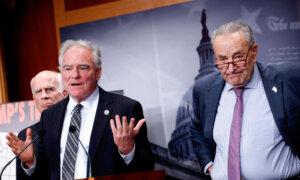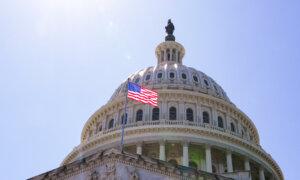“They need to fight harder,” one voter told The Epoch Times. It was a common sentiment among Democrats.
President Donald Trump’s sweeping electoral victory in 2024 marked one of the biggest challenges to Democrats’ sense of self that the party had ever endured.
Even top-ranking members in the party have been open about the challenges of moving forward from 2024.
It’s a sentiment that Democratic voters shared when they spoke to The Epoch Times.
For the time being, many Democratic voters want stronger action and opposition to Trump from the national party—but beyond that core area of agreement, both generational and ideological divides linger in the party.
Here’s how Democrats are feeling after 100 days of Trump’s second term.
‘They Need to Fight Harder’
For much of the first 100 days, Democrats have been reactive.
Trump’s aggressive first 100 days, including dismantling some government agencies, mass layoffs of federal bureaucrats, and strong immigration law enforcement, have prompted little official response from the out-of-power Democrats aside from public condemnations.
Many Democratic voters said that the party hasn’t been aggressive enough in its opposition. But they also said that Democrats were overwhelmed by the speed of the changes.
“It’s startling how fast and furious it all began, right out of the gate,” Laura Self of St. Louis told The Epoch Times during an April 25 Democratic event in Chesterfield, Missouri.
“They do a great job of flooding the zone,” Paul Shapiro said at the same event.
Attendees said they are becoming frustrated with what they perceive as inaction. These voters want unity in the party and more aggressive opposition to administration policies that they see as executive overreach.
“On Jan. 20, 2025, the United States stopped being a constitutional democracy,” John Hixson of Wildwood, Missouri, told The Epoch Times. “We’re being ruled by royal decree.”
Several attendees said they were initially disappointed by the response of the Democratic Party to Trump’s rapid-fire actions.
“They’re completely disorganized,” Hixson said, referencing humorist Will Rogers’ line, “I would never belong to an organized political party. I’m a Democrat.”
“We were very disappointed,” Steve Hargis of Chesterfield told The Epoch Times of Democrats’ initial response.
The sentiment was shared by Terry Gasperino, who spoke to The Epoch Times at an event in Saxaphaw, North Carolina.
When asked whether the party needed reform, Gasperino replied: “Reform? They need to fight harder right now, we have a democracy that’s in peril.”
After a response that many Democratic voters saw as their party floundering, these voters nevertheless feel that the party is beginning to pick itself back up, and they remain hopeful.
Focus on Kitchen Table Issues
After 2024, one wing of Democrats believed that the election outcome was a warning that the party needed to moderate on divisive social issues such as gender identity and crime and focus on core kitchen table issues.
Diane Maisel, who first phone-banked for Democrats in the 1970s for President Jimmy Carter, told The Epoch Times this was “obvious.”
“That’s the thing that hits everyday people, and that’s where Democrats are for the middle class,” Maisel said at a Democratic event in Saxaphaw, North Carolina.
One voter, who identified as an old-school Democrat, told The Epoch Times that the party needs to tone down its LGBT rhetoric.
Mark Mellman, president of Democratic consulting firm The Mellman Group, said, “I think the Democratic Party can be focused on more than one thing at a time, but the reality is, hard as it is for us Democrats to believe, voters see us as just as extreme as Republicans.”
He said this “doesn’t make sense to us Democrats, but that’s the fundamental reality, and so we have to moderate our image, and we have to focus on what’s most important to most people.”
Neama Rahmani, a lawyer who often comments on national Democratic politics, agreed.
“I think there are some issues that are just bad issues for Democrats, and they’ve lost voters because of it: crime, immigration, homelessness. I think they allowed a lot of the transgender issues to become front and center,” Rahmani told The Epoch Times.
Progressives, meanwhile, have portrayed the loss as a sign that the party had lost its way with the working class and sought to exert stronger influence on Democratic politics.
Potential 2028 Candidates
After the contentious 2024 Democratic nomination process—during which then-Vice President Kamala Harris rapidly replaced then-President Joe Biden without competition from an open primary field—the party found itself without a clear leader.
Polls show the current uncertain position of the party.
Democratic voters have consistently favored Harris as the party’s 2028 standard bearer by around 25–37 points, but there’s no clear favorite.
Rahmani said that in reality, this had been the party’s position since former President Barack Obama left office.
“Who else do the Democrats have right now? … I think you really need a leader to emerge. I think that that’s certainly been lacking since Obama. You really need someone that’s going to step up and galvanize the party,” Rahmani said.
In the interim, potential future presidential candidates are already beginning to market their vision for the party to voters.
Sen. Bernie Sanders (I-Vt.) and Rep. Alexandria Ocasio-Cortez (D-N.Y.) hit the road in March and April as part of the “Fighting Oligarchy Tour,” which focused on combating wealthy and corporate influence in the United States.
But other Democrats are also making incursions.
The speech had a strong influence on Democrats’ morale, voters and analysts said.
“People were looking for somebody to lead, somebody to fight back, and in dramatic fashion,” Mellman said. “I think a lot of Democratic leaders have been fighting back in the normal fashion. Booker did it in dramatic fashion. And that drama, I think, buoyed a lot of Democrats.”
Democratic voters were enthusiastic about the speech in comments to The Epoch Times.
Other possible contenders—including Newsom and Kentucky Gov. Andy Beshear—have also sought to have an influence through podcasts and appearances on shows meant to appeal to young men, who heavily favored Trump in 2024.
Party Divides Remain
Democratic voters were often optimistic that the party was broadly united against Trump. But under the surface, infighting continues along both generational and ideological lines.
Generational divides are nothing new for Democrats, who have historically been favored by young voters. In recent years, however, the divides between the young and the establishment have grown.
The first echoes of this were visible at the end of the 117th Congress, when nearly the entirety of Democrats’ octogenarian leadership stepped down to make room for younger leaders.
Generational divisions were put on full display in 2024, when Democratic leaders struggled to formulate a response to pro-Gaza and anti-Israel student protests on college campuses across the country.
The party’s reaction alienated many young voters and paved the way for continuing infighting.
Recently, Democratic National Committee Vice Chair David Hogg announced that his outside group, Leaders We Deserve, will spend $20 million on funding primary challenges to incumbent congressional Democrats.
The goal, Hogg has said, is fundamental reform to the party.
“That’s not actually wanting change. That’s selfishness.
“More than anything, it is: Do you want to roll over and die, or do you want to fight? And too many people look at our party right now and feel like we want to roll over and die.”
Democrats Look to 2026
Still, for party strategists and voters alike, the current goal is 2026, when Democrats hope to reclaim some influence in Washington in the midterms.
While the party is unlikely to reclaim the Senate, given a favorable map for Republicans in the upper chamber, the narrowly divided House is much more open for Democratic incursion.
“I’m optimistic about 2026,” Mellman said, adding that he thinks the Republicans are going “to pay a substantial political price in 2026” for the policies they have enacted under Trump.
Rahmani told The Epoch Times that Democrats’ strategy right now should be to oppose the administration as much as possible through the courts while laying the groundwork for 2026.
Already, Democrats have been seeking to politically capitalize on growing angst among some voters with certain aspects of the Republican agenda—most notably the Department of Government Efficiency (DOGE) and tariffs—with town halls in GOP districts across the country.
One such event held in Pennsylvania’s Eighth Congressional District, dubbed the “Good Trouble Fest” in reference to the late Rep. John Lewis’s (D-Ga.) saying, featured tables with Democrat and progressive groups helping people register to vote and be politically active in their community.
Kait Ahern, deputy political director for the Pennsylvania Democrats, told The Epoch Times that the purpose of the event was to allow people “to take action now outside the ballot box.”
The event also included an open mic session where microphones were passed around the room, allowing people to freely express their displeasure over the current administration. Issues discussed ranged from potential cuts to Medicaid to personal attacks against Trump.
In North Carolina’s Eighth Congressional District, represented by Rep. Richard Hudson (R-N.C.), a town hall hosted by Sen. Chris Murphy (D-Conn.) and Rep. Maxwell Frost (D-Fla.) packed a ballroom.
Original News Source Link – Epoch Times
Running For Office? Conservative Campaign Consulting – Election Day Strategies!


